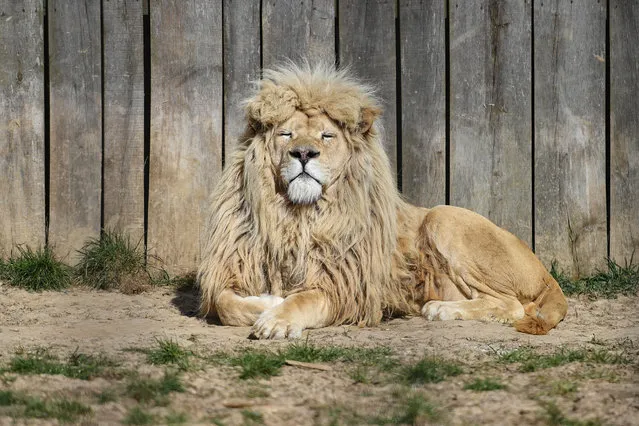
A lion takes a sun bath at the zoo in Wojciechow near Lublin, eastern Poland, 1 April 2020. The center was deprived of income due to forced closure of the coronavirus during a pandemic and calls for help for over 150 animals. There is a shortage of money for feeding and keeping animals. (Photo by Wojtek Jargiło/EPA/EFE)
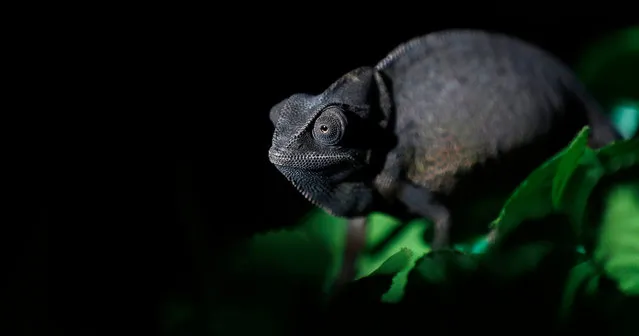
A Yemen chameleon crawls on artificial leaves at a house in Sanaa, Yemen, 26 March 2020. The veiled chameleon (Chamaeleo calyptratus) is native to the Arabian Peninsula in Yemen and Saudi Arabia and can live up to five years. (Photo by Yahya Arhab/EPA/EFE)
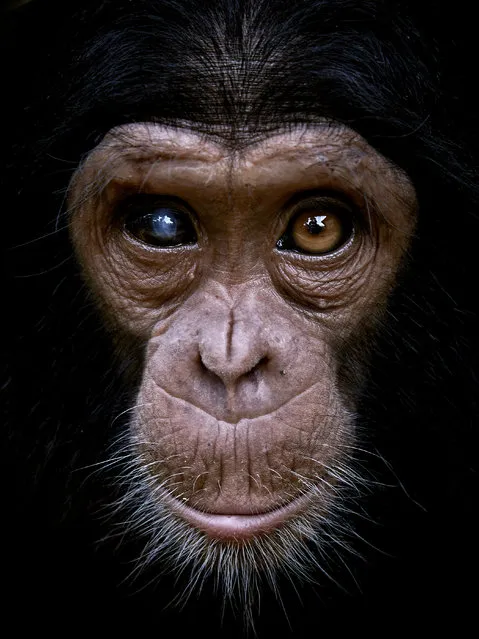
Felix, a baby chimpanzee with sight issues is seen at Lwiro Primates centre in Lwiro, South Kivu, the Democratic Republic of the Congo, 05 March 2020. (issued 17 March 2020) Felix was rescued from poachers, a common occurrence in DR Congo where unique species are threatened by factors such as deforestation and poaching for the pet and bushmeat trades. The Democratic Republic of Congo is home to some of the world’s most biodiverse locations, however, conflict, poachers and lawlessness are a constant threat to the unique species inhabiting the forests. Conservation authorities have created a safe haven for threatened chimpanzees and several other species of monkey. Orphaned by poaching, saved from the pet or bushmeat trade, rescued primates are often traumatised and medically vulnerable. (Photo by Hugh Kinsella Cunningham/EPA/EFE)
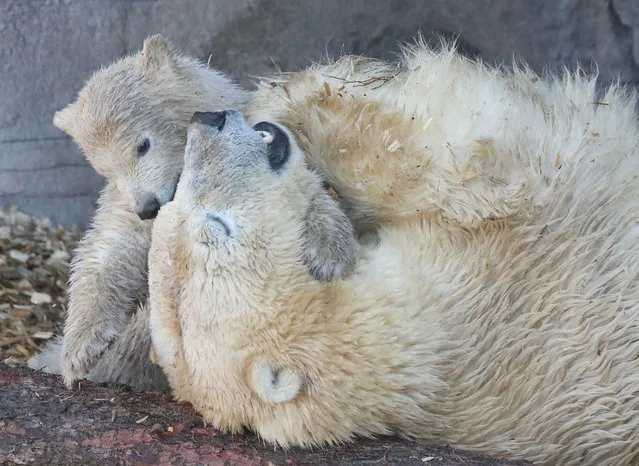
Milana the polar bear cub plays with its mother in their enclosure at the city’s zoo in Hanover, Germany on March 24, 2020. (Photo by Action Press/Rex Features/Shutterstock)
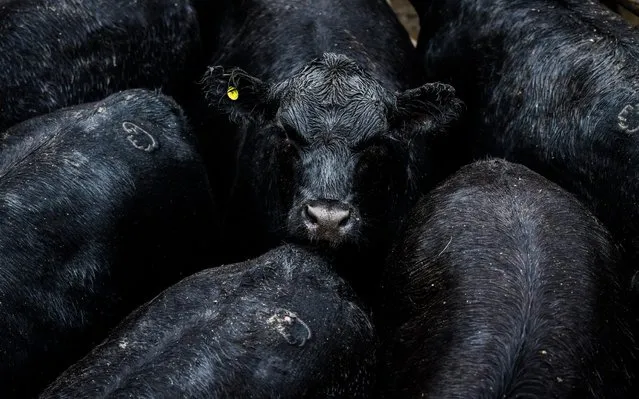
An Angus cow looks on as it kept in a pensat the auction yard of Liniers Cattle Market on March 25, 2020 in Buenos Aires, Argentina. Price of livestock suffered raises of around 17% since March 6 after a 4-day farmers strike, heavy rains, production slowdowns in meat packing plants and a high demand before quarantine against COVID-19. As a sanitary precaution measure, no in person auctions are allowed and all deals are closed by telephone or online. (Photo by Amilcar Orfali/Getty Images)
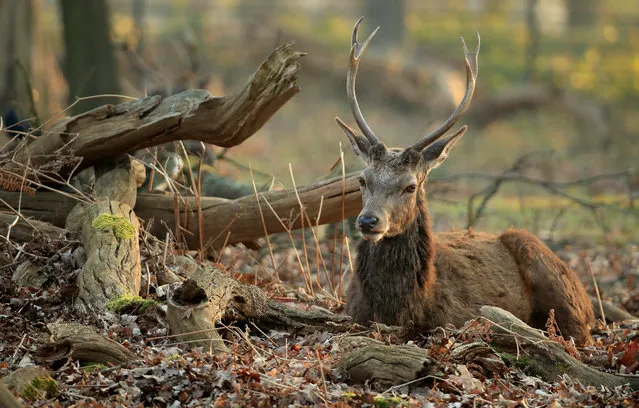
A deer is pictured in Richmond Park on March 27, 2020 in London, England. The royal parks have remained open as the Coronavirus (COVID-19) pandemic has spread to many countries across the world, claiming over 20,000 lives and infecting hundreds of thousands more. (Photo by Andrew Redington/Getty Images)
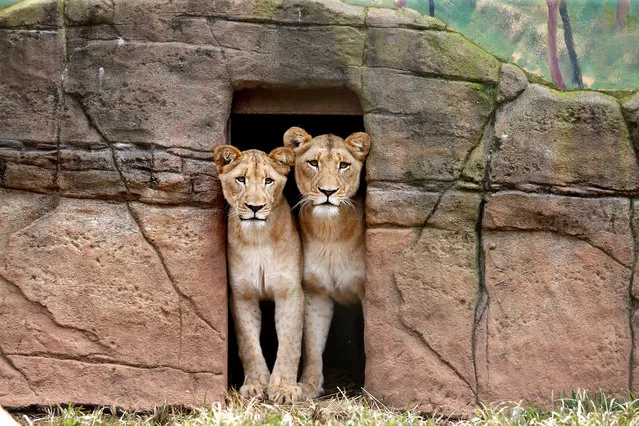
Lions peer out of their sleeping quarters at the family-owned Billabong Zoo, which was forced to close due to the coronavirus disease (COVID-19), in Port Macquarie, NSW, Monday, March 30, 2020. (Photo by Nathan Edwards/AAP Image)
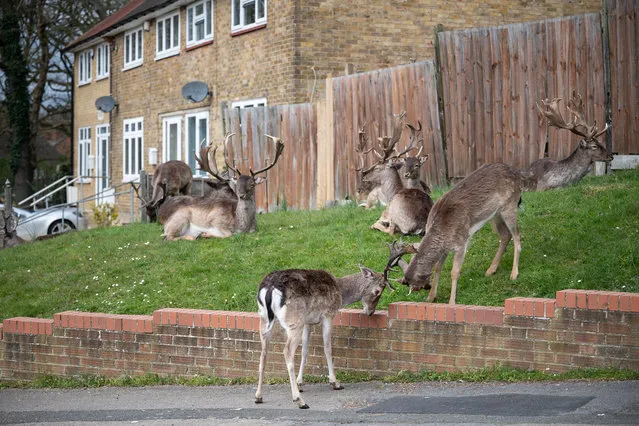
Fallow deer from Dagnam Park rest and graze on the grass outside homes on a housing estate in Harold Hill, near Romford on April 02, 2020 in Romford, England. The semi-urban deer are a regular sight in the area around the park but as the roads have become quieter due to the nationwide lockdown, the deer have staked a claim on new territories in the vicinity. The Coronavirus (COVID-19) pandemic has spread to many countries across the world, claiming over 40,000 lives and infecting hundreds of thousands more. (Photo by Leon Neal/Getty Images)
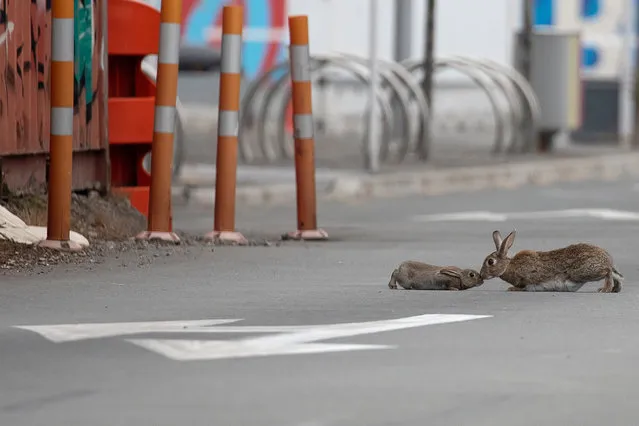
A baby rabbit and its mother leveret sharing an intimate moment middle of a main road which is empty of traffic in Christchurch, New Zealand, on April 01, 2020. New Zealand has been lockdown for four weeks in an attempt to minimize the spread of the Covid-19 virus since the 25th of March. There are currently 708 cases of COVID-19 in New Zealand and one person died as a result of the virus. (Photo by Sanka Vidanagama/NurPhoto via Getty Images)
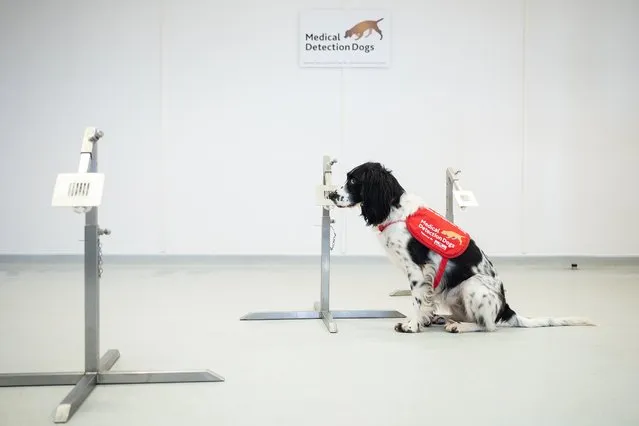
“Freya” correctly detects a sample of malaria from a row of sample pots at the “Medical Detection Dogs” charity headquarters on March 27, 2020 in Milton Keynes, England. The charity is currently working with the London School of Hygiene and Tropical Medicine to test whether the dogs can be re-trained in the next six weeks to provide a rapid, non-invasive diagnosis of the virus. Medical Detection Dogs has successfully trained it's dogs to detect cancer, Parkinson's and bacterial infections, through the sense of smell and is now looking for donations to help cover the costs of the intensive programme. The Coronavirus (COVID-19) pandemic has spread to many countries across the world, claiming over 20,000 lives and infecting hundreds of thousands more. (Photo by Leon Neal/Getty Images)
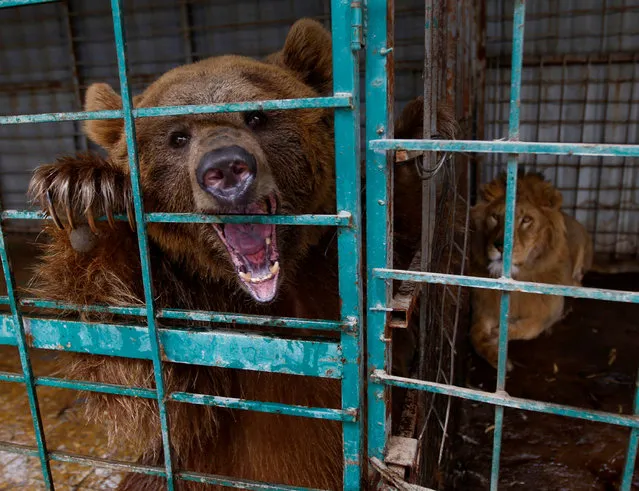
A lion and a bear are seen in a closed zoo, as the zoo staff was advised to not come to work, due to a curfew to prevent the spread of the coronavirus disease (COVID-19), in the holy city of Najaf, Iraq, March 25, 2020. (Photo by Alaa al-Marjani/Reuters)
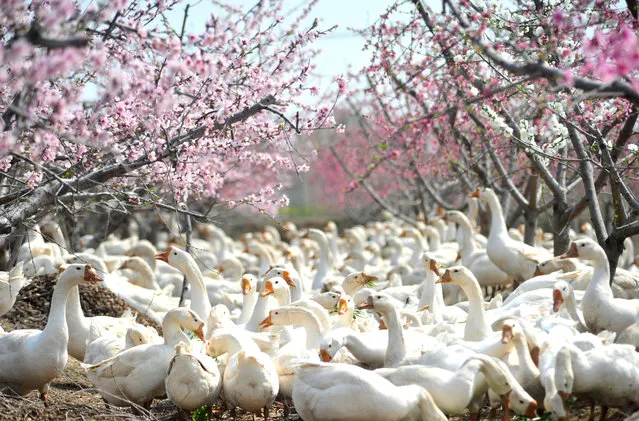
A group of white geese are herded under a peach tree by a breeder in Suining County, Jiangsu Province, China, March 27, 2020. (Photo credit should read Costfoto/Barcroft Media via Getty Images)
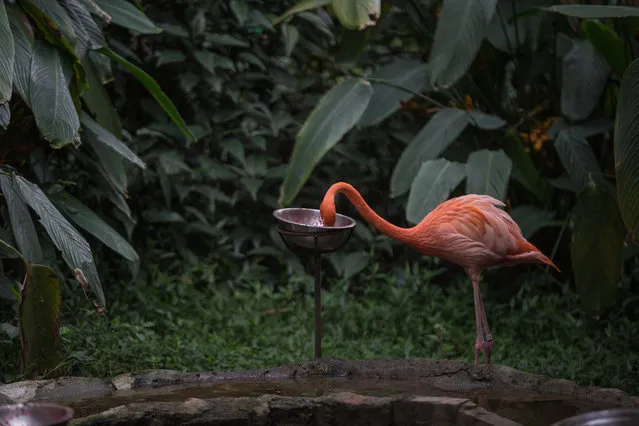
An American flamingo is seen as zookeepers feed animals at the Santa Cruz Foundation Zoo in Tequendama, Colombia on April 03, 2020. Colombia as the second most biodiverse country in the world, the zoos have been affected by the lack of visitors and suffer to meet expenses due to forced closure to contain the pandemic of the novel coronavirus (COVID-19). (Photo by Juancho Torres/Anadolu Agency via Getty Images)
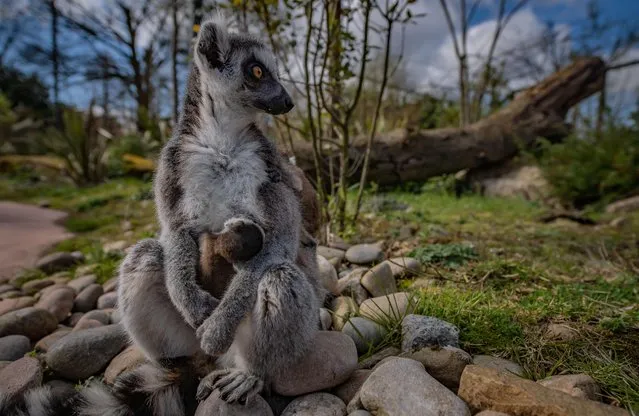
Recently born Madagascan ring-tailed lemur twins on their mother at the city’s zoo in Chester, England on March 18, 2020. (Photo by Chester Zoo/Handout via Reuters)
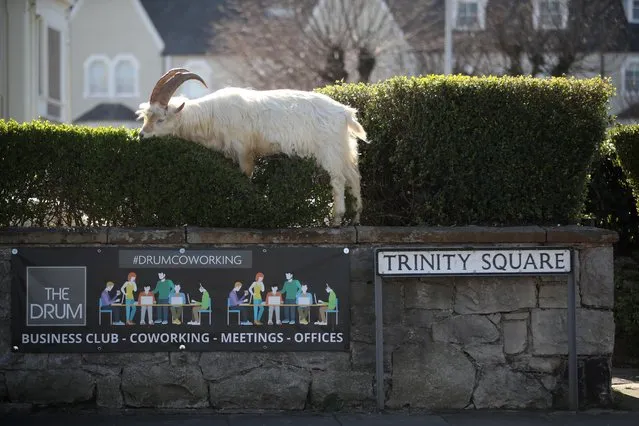
A goat is seen in Llandudno as the spread of the coronavirus disease (COVID-19) continues, Llandudno, Wales, Britain, March 31, 2020. (Photo by Carl Recine/Reuters)
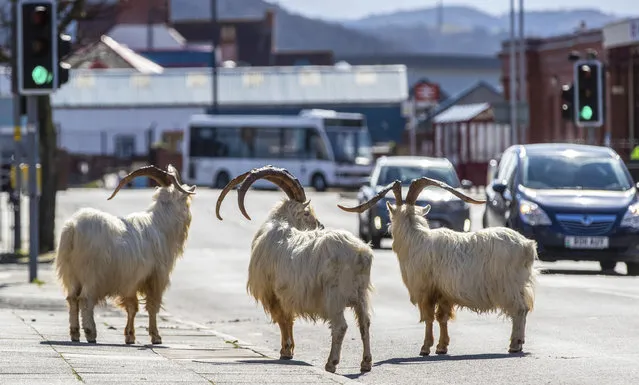
A herd of goats walk the quiet streets in Llandudno, north Wales, Tuesday March 31, 2020. A group of goats have been spotted walking around the deserted streets of the seaside town during the nationwide lockdown due to the coronavirus. (Photo by Pete Byrne/PA Wire via AP Photo)
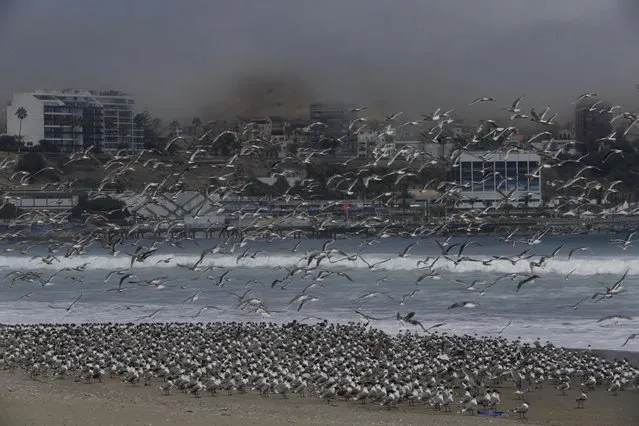
Hundred of birds overtake Agua Dulce beach which is usually populated with people, in Lima, Peru, Tuesday, March 24, 2020. Peru is in its second week of a government decreed state of emergency, after President Martin Vizcarra ordered residents to stay in their homes in an effort to contain the spread of the new coronavirus. (Photo by Martin Mejia/AP Photo)
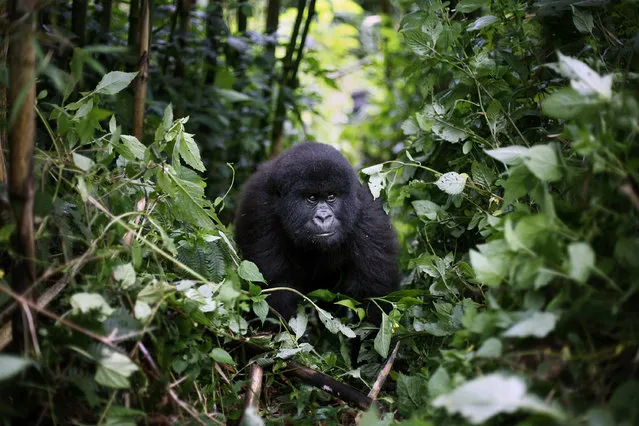
In this photo taken December 11 2012, a young mountain gorilla is seen in the Virunga National Park in eastern Congo. Congo's Virunga National Park, home to about a third of the world's mountain gorillas, has barred visitors until June 1 2020, citing “advice from scientific experts indicating that primates, including mountain gorillas, are likely susceptible to complications arising from the COVID-19 virus”. (Photo by Jerome Delay/AP Photo)
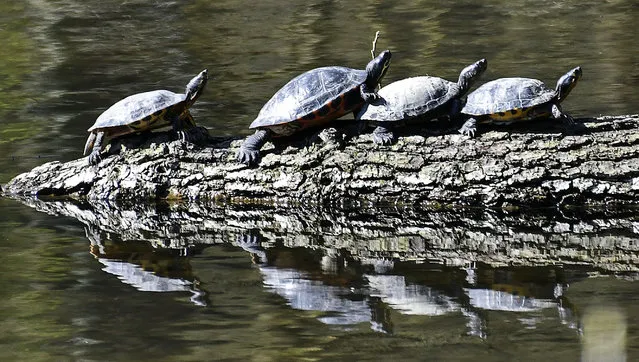
Turtles don't care about social distancing at a lake in Gelsenkirchen, Germany, Sunday, March 22, 2020. In order to slow down the spread of the coronavirus, the German government has considerably restricted public life and asked the citizens to stay at home. (Photo by Martin Meissner/AP Photo)
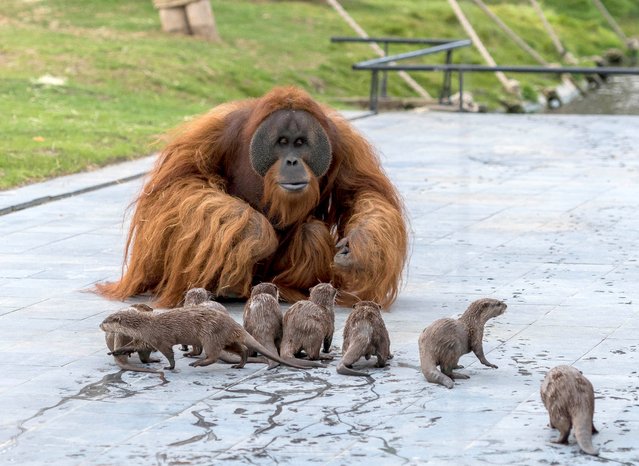
The three orangutans at Pairi Daiza zoo, Belgium, developed a “special bond” with the otters after their river was run through the ape enclosure on March 2020. The zoo said it enriched both species’ environments. An animal – and this is even more the case of orangutans, with whom humans share 97 per cent of their DNA – must be entertained, occupied, challenged and kept busy mentally, emotionally and physically at all times. (Photo by Pascale Jones/The Sun)
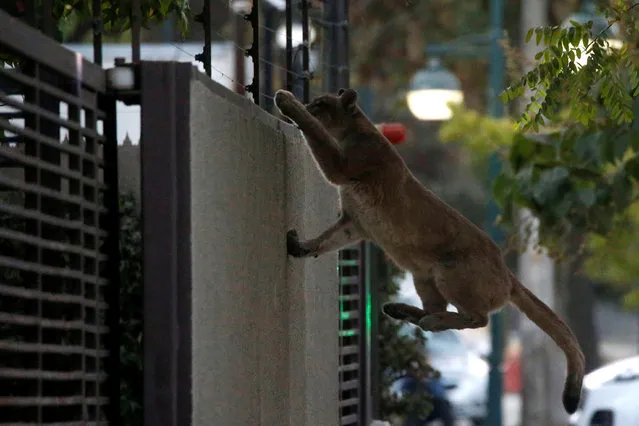
A puma climbs a wall during the dawn at a neighbourhood before being captured and taken to a zoo, in Santiago, Chile on March 24, 2020. (Photo by Andres Pina/Reuters)
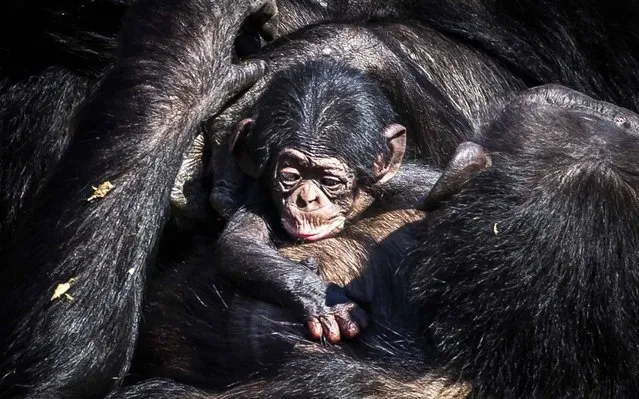
The newborn chimpanzee walks outside with mother Pepa in Safaripark Beekse Bergen in Hilvarenbeek, The Netherlands, 01 April 2020. The chimpanzee was born this weekend. (Photo by Remko De Waal/EPA/EFE)
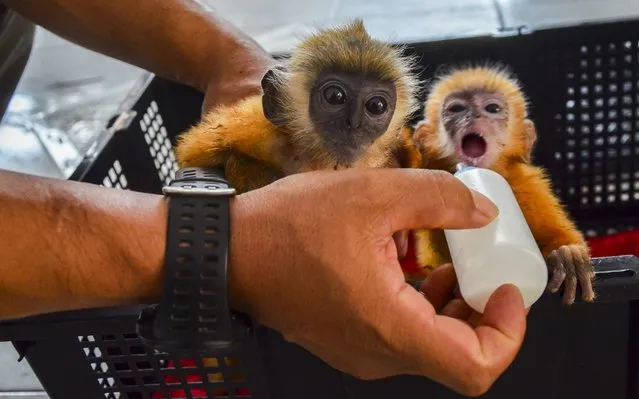
Officers of the Natural Resources Conservation Office give milk to Lutung babies in Pekanbaru City, Indonesia on April 1, 2020. There are three Lutung babies that have been rescued by officers from the illegal trade. (Photo by Yurifha/Opn Images/Barcroft Media via Getty Images)
05 Apr 2020 00:01:00,
post received
0 comments
